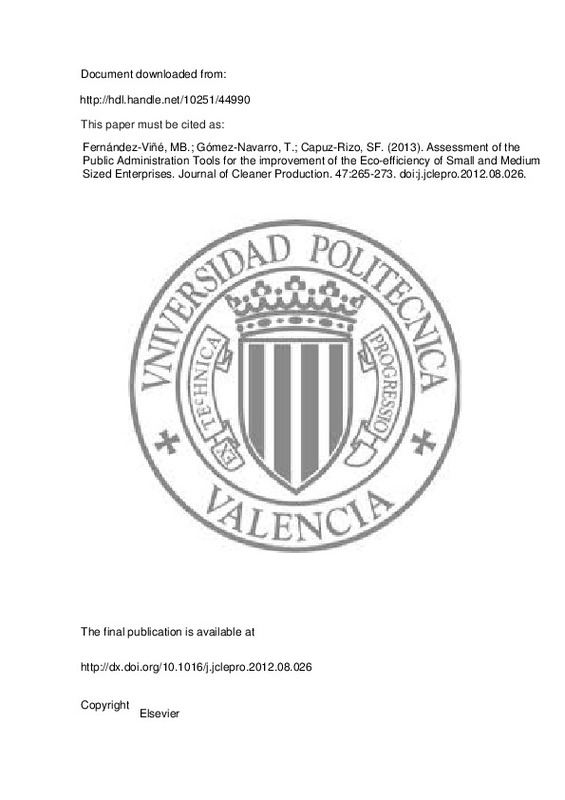JavaScript is disabled for your browser. Some features of this site may not work without it.
Buscar en RiuNet
Listar
Mi cuenta
Estadísticas
Ayuda RiuNet
Admin. UPV
Assessment of the Public Administration Tools for the improvement of the Eco-efficiency of Small and Medium Sized Enterprises
Mostrar el registro sencillo del ítem
Ficheros en el ítem
| dc.contributor.author | Fernández-Viñé, María B.
|
es_ES |
| dc.contributor.author | Gómez-Navarro, Tomás
|
es_ES |
| dc.contributor.author | Capuz-Rizo, Salvador F.
|
es_ES |
| dc.date.accessioned | 2014-11-28T13:09:04Z | |
| dc.date.available | 2014-11-28T13:09:04Z | |
| dc.date.issued | 2013-05 | |
| dc.identifier.issn | 0959-6526 | |
| dc.identifier.uri | http://hdl.handle.net/10251/44990 | |
| dc.description.abstract | Small and Medium Sized Enterprises (SME) face barriers to the implementation and development of eco-efficiency that could be overcome taking advantage of the adequate stimuli and incentives. A previous research and a thorough literature analysis show Public Administration (PA) is a key stakeholder. PA could use better its tools to stimulate SME to improve their ecoefficiency. Among these tools it can be named well known command and control tools like legislation or taxes, but also price policies, green procurement, ecological education, eco-innovation support and others. This paper reviews these tools and how they contribute to overcome barriers to ecoefficiency by offering external and internal incentives for SME. The analysis is focused on the case of Venezuelan public administration and SME but it can be generalized to other case studies. In addition, a panel of experts validates the results and assesses the public administration tools by means of the policy Delphi method. The assessment is based on criteria like: market influence, capability of the public administration for controlling results, tool costs, impact on public administration image, timespan to get results, etc. The assessment, therefore, allows ranking and understanding the tools according to their effectiveness and efficiency to support SME to improve their ecoefficiency. Due to the specific characteristics of the case study: SME of Venezuela, the method shows the best mix of public administration tools includes mainly command and control tools. Also the mix includes certain new-approach tools like advertising about responsible consumption and eco-efficient products, or education/training in environmental responsibility. The method also allows understanding better how the tools will help accomplishing the objectives for ecoefficiency of the public administration. Therefore, this research provides a method for raising information to be used when planning the actions to improve eco-efficiency of the SME. | es_ES |
| dc.language | Inglés | es_ES |
| dc.publisher | Elsevier | es_ES |
| dc.relation.ispartof | Journal of Cleaner Production | es_ES |
| dc.rights | Reserva de todos los derechos | es_ES |
| dc.subject | Eco-efficiency | es_ES |
| dc.subject | Environmental public policy | es_ES |
| dc.subject | SME | es_ES |
| dc.subject.classification | PROYECTOS DE INGENIERIA | es_ES |
| dc.title | Assessment of the Public Administration Tools for the improvement of the Eco-efficiency of Small and Medium Sized Enterprises | es_ES |
| dc.type | Artículo | es_ES |
| dc.identifier.doi | 10.1016/j.jclepro.2012.08.026 | |
| dc.rights.accessRights | Abierto | es_ES |
| dc.contributor.affiliation | Universitat Politècnica de València. Departamento de Proyectos de Ingeniería - Departament de Projectes d'Enginyeria | es_ES |
| dc.description.bibliographicCitation | Fernández-Viñé, MB.; Gómez-Navarro, T.; Capuz-Rizo, SF. (2013). Assessment of the Public Administration Tools for the improvement of the Eco-efficiency of Small and Medium Sized Enterprises. Journal of Cleaner Production. 47:265-273. doi:10.1016/j.jclepro.2012.08.026 | es_ES |
| dc.description.accrualMethod | S | es_ES |
| dc.relation.publisherversion | http://dx.doi.org/10.1016/j.jclepro.2012.08.026 | es_ES |
| dc.description.upvformatpinicio | 265 | es_ES |
| dc.description.upvformatpfin | 273 | es_ES |
| dc.type.version | info:eu-repo/semantics/publishedVersion | es_ES |
| dc.description.volume | 47 | es_ES |
| dc.relation.senia | 243496 |







![[Cerrado]](/themes/UPV/images/candado.png)

